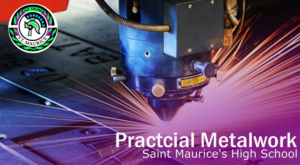
The National 5 Practical Metalworking course is offered in Saint Maurice’s by the Technical department for S5/6 pupils as a one year course. Past experience of either N5 Practical Woodworking or N5 Design and Manufacture is essential to cope with skills required by this course.
Practical Metalworking provides opportunities for pupils to gain a range of theoretical and practical metalworking skills relating to tools, equipment, processes and materials. They also develop skills in reading and interpreting working drawings and related documents as well as an understanding of health and safety.
The course is practical, exploratory and experiential in nature. It engages candidates with technologies, allowing them to consider the impact that practical technologies have on our environment and society.
Through this, they develop skills, knowledge and understanding of:
– metalworking techniques
– measuring and marking out metal sections and sheet materials
– safe working practices in workshop environments
– practical creativity and problem-solving skills
– sustainability issues in a practical metalworking context
Course Content
Pupils will make several different models to prepare for their final practical assignment. Each model covers the following skills;
Bench skills
Pupils develop skills, knowledge and understanding in the use of metalworking hand tools, bench-fitting work, routine sheet-metal work, measuring and marking out, involving complex features. They will also develop their ability to read and use drawings and diagrams depicting both familiar and unfamiliar metalwork tasks.
Machine processes
Pupils develop skills, knowledge and understanding in the use of metalworking machines, equipment, related processes, materials, measuring and marking out, involving complex features.
Fabrication and thermal joining
Pupils develop skills, knowledge and understanding in fabrication, forming and joining of metalwork components with some complex features. They also develop skills in thermal joining techniques and in measuring and marking out.
Course Assessment
Pupils are assessed on both their practical skills and knowledge and understanding of the related theory work. Pupils will make three models over the course which will prepare them for their final component of assessment for the SQA. This exam piece contributes 70% of their overall grade for the National 5 course. The other 30% is determined by an exam style question paper which relates to theory work covered throughout the course.
My World of Work
Joinery, Carpenter, Wood machinist/ sander, Furniture maker, Wood turner, Wood carving, Cabinetry, Timber framers, Product Designer, Wide range of engineering, Design manufacture engineer, Civil engineer, Electrical engineer, Mechanical engineer, Upholstery are just some of the careers that would require skills gained throughout Practical Woodworking.
This is also a wonderful course to develop manual skills for anyone who is considering a career that requires working intricately by hand.
Further career information can be explored on:
Further Education and Progression
Many students leave St Maurice’s and go on to Higher Education to further develop their knowledge in one of the Technical subjects and many take up apprenticeships.
Establishments such as those listed below offer wonderful courses from NC level through HNC and HND to Degree..
Colleges
North College Lanarkshire
Campuses in Coatbridge, Cumbernauld, Motherwell, Kirkintilloch (Art), Broadwood (Sports):
Woodwork:
Joinery Level 1 – https://www.nclanarkshire.ac.uk/courses/joinery-level-1/
Joinery Level 2 – https://www.nclanarkshire.ac.uk/courses/joinery-level-2/
Metalwork:
Fabrication and Welding NC – https://www.nclanarkshire.ac.uk/courses/nc-fabrication-and-welding-engineering/
Evening course Welding – https://www.nclanarkshire.ac.uk/courses/practical-welding/
Electrical NC – https://www.nclanarkshire.ac.uk/courses/nc-electrical-engineering/
Electrical HNC – https://www.nclanarkshire.ac.uk/courses/hnc-electrical-engineering/
Glasgow Clyde
Campuses in Anniesland, Cardonald and Langside
Construction:
https://www.glasgowclyde.ac.uk/study/subject-areas/6-construction
City of Glasgow
Campuses on River Clyde and Cathedral Street.
Construction:
Architectural Technician / Quantity Surveyor: https://www.cityofglasgowcollege.ac.uk/courses/nq-built-environment-scqf-level-6-2024-08-26
Product Design:
Product Design HNC: https://www.cityofglasgowcollege.ac.uk/courses/hnc-3d-designhnc-3d-design-product-design-and-manufacturing-scqf-level-7-2024-08-26
Electrical Engineering:
Electrical Engineering HNC: https://www.glasgowkelvin.ac.uk/courses/electronic-engineering-hnc/
Glasgow Kelvin College
Campuses in Springburn, East End, Easterhouse
Electrical Engineering:
Electrical Engineering HNC: https://www.glasgowkelvin.ac.uk/courses/electronic-engineering-hnc/
South College Lanarkshire
Campus in East Kilbride
Introduction to Construction: https://www.slc.ac.uk/course-results/2932-introduction-to-construction/

